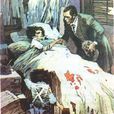《小珊迪》這篇文章是英國作家迪安·斯坦雷的作品,又譯《賣火柴的小男孩》,被收入中國語文教材九年義務教育六年制上海國小語文第八冊的第二十七課和人教版 北京課改版中的一篇課文。這是一篇講讀課文,課文講述的是貧窮的小珊迪靠賣火柴生活,不幸被馬車軋斷雙腿,悲慘死去的故事。
基本介紹
- 中文名稱:小珊迪
- 外文名稱:THE LITTLE MATCH-BOY.
- 地位:國小課本讀物
- 類型:記事文
- 故事背景:英國愛丁堡
- 作者:迪安·斯坦雷
- 其他譯名:賣火柴的小男孩
- 朗讀人:金鋒
- ISRC:CN-M01-02-305-16/A.H
作品介紹,課文全文,原文內容,
作品介紹
課文就是迪安·斯坦雷(本名:亞瑟·彭林·斯坦利,Arthur Penrhyn Stanley1815—1881)根據他親身經歷的一個真實故事而寫成的。
英國作家迪安·斯坦雷 《小珊迪》這篇文章的一部分被選為九年義務教育六年制國小語文第七冊的第六課。這是一篇講讀課文,課文講述的是在資本主義社會里小珊迪靠賣火柴生活,不幸被馬車軋斷雙腿,悲慘的死去的故事。表現了小珊迪誠實、善良的品質。
課文全文
故事發生在愛丁堡。
有一天,天氣很冷,我和一位同事站在旅館門前談話。
一個小男孩走過來,他身上只穿著一件又薄又破的單衣,瘦瘦的小臉凍得發青,一雙赤著的腳凍得通紅。他對我們說:“先生,請買盒火柴吧!”
“不,我們不需要。”我的同事說。
“一盒火柴只要一個便士呀!”可憐的孩子請求著。
“可是,我們不需要火柴。”我對他說。
小男孩想了一會兒,說:“我可以一便士賣給你們兩盒。”
為了使他不再糾纏,我答應買一盒。可是在掏錢的時候,我發現身上沒帶零錢,於是對他說:“我明天再買吧。”
“請您現在就買吧!先生,我餓極了!”男孩子乞求道,“我給您去換零錢。”
我給了他一先令,他轉身就跑了,等了很久也不見他回來,我想可能上當了,但是看那孩子的面孔,看那使人信任的神情,我又斷定他不是那種人。
晚上,旅館的侍者說,有個小男孩要見我。小男孩被帶進來了。我發現他不是賣火柴的那一個,但可以看出是那個男孩的弟弟。小男孩在破衣服里找了一會兒,然後才問:“先生,您是向珊迪買火柴的那位先生嗎?”
“是的。”
“這是您那個先令找回來的4個便士。”小男孩說,“珊迪受傷了,不能來了。一輛馬車把他撞倒了,從他身上軋了過去。他的帽子找不到了,火柴也丟了。還有7個便士也不知哪兒去了。說不定他會死的······”
我讓小男孩吃了些東西,跟著他一塊兒去看珊迪。這時我才知道,他們倆是孤兒,父母早死了。可憐的珊迪躺在一張破床上,一看見我就難過地對我說:“我換好零錢往回跑,被馬車撞倒了,軋斷了兩條腿。我就要死了。可憐的小利比。我的好弟弟!我死了你怎么辦呢?誰來照顧你呢?”
我握住珊迪的手,對他說:“我會永遠照顧小利比的。”
珊迪聽了,目不轉睛地看著我,好像對我表示感激。突然,他眼睛裡的光消失了。他死了。
直到今天,誰讀了這個故事不受感動呢?飽受饑寒的小珊迪的美好的品質,將永遠打動人們的心。
原文內容
THE LITTLE MATCH-BOY.
One very cold day, not long ago, in Edinburgh, two gentlemen were standing at the door of a hotel. A little boy with a thin blue face, his feet bare and red with the cold, and with nothing to cover him but a bundle of rags, came to them and said:"Please, sir, buy some matches."
"No, I don't want any." answered one of the gentlemen.
"But they are only a penny a bog." pleaded the poor little fellow.
"Yes, but, you see, we don't want a bog." the gentleman said again.
"Then I will give you two boxes for a penny." the boy said.
At last. "So, to get rid of him," said the gentleman to me."I bought a bog." Then, finding I had no change, I said to him,"I will buy a bog tomorrow."
"Oh, please buy them tonight." the boy pleaded again:"I will run and get you the change, for I am very hungry."
So I gave him the shilling, and he started away. I waited for him, but no boy came.
I thought I had lost my shilling. Still, there was something in the boy's face I trusted, and I did not like to think bad of him.
Late in the evening I was told that a little boy wanted to see me. I found, when he was brought in, it was a smaller brother of the boy who took my shilling. But, if possible, still more ragged and poor.
He stood a moment, diving into his rags as if he were seeking something, and then said:"Are you the gentleman who bought the matches from Sandy."
"Yes."
"Well, then, here are fourpence out of your shilling. Sandy cannot come. he's very sick. A cart ran over him and knocked him down. He lost his cap and matches and seven pence of your money. Both his legs were broken, and the doctor says he'll die, and that's all."
I fed the little fellow, and then went with him to see Sandy. I found that the two children lived almost alone, for their father and mother were dead.
Poor Sandy was lying on a bundle of shavings. He knew me as soon as I wentin, and said:"I got the change, sir, and was coming back, but the horse knocked me down, and both of my legs are broken! Oh, Reuby! little Reuby! I'm sure I'm dying, and who will take care of you when I am gone,What will you do, Reuby."
Then I took him by the hand, and said:"I would always take care of Reuby."
He understood me, and had just strength enough to look up to me as if to thank me. Then the light went out of the blue eyes. In a moment,
"He lay within the light of God, Like a babe upon the breast, Where the wicked cease from troubling And the weary are at rest."
That story is like an arrow in the hand of a giant. It ought to pierce many a heart, old and young.
Whenever, dear children, you are tempted to say what is not true, or to be unkind to other boys and girls, or to take what you ought not to take, remember little Sandy.
This poor little boy, lying on a bundle of shavings, dying and starving, was tender,trusty, and true. So God told the gentleman to take poor little friendless Reuben and be a friend to him. Sandy heard him say he would do it-the last thing he ever did hear.
Then the dark room, the bundle of shavings, the weary, broken limbs, all faded away, and Sandy was with the angels.
They could look at him in his new home, and say one to another,“That is the little boy who kept his word and sent back four pence. He was tender, trusty, and true, when he was hungry and faint, when both his legs were broken, and he lay dying."
This story is told you now because, whether you find it hard or easy, we want you to be tender and trusty and true as poor little Sandy was, who did not forget his promise, and who loved his little brother to the end.
DEAN STANLEY.

